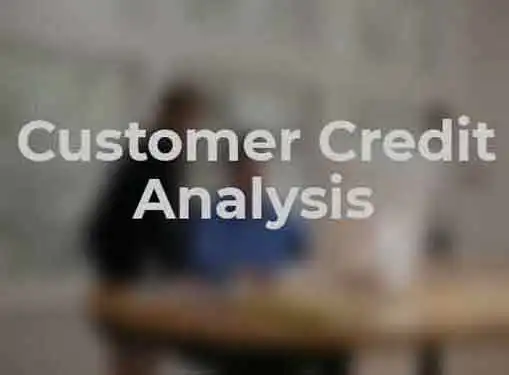Accounting for Entrepreneurs
Customer Credit Analysis
It's painful to hear, but your business could have avoided writing off a large percentage of no-pay customers. All you needed was a customer credit analysis process.
Remember the last time your business applied for credit?

You had to provide the lender with all kinds of information. Financial statements, your employer ID number and maybe even some personal credit information - it's all standard operating procedure in business financing.
Yet many small businesses neglect to perform the same level of credit analysis on their own customers. Whenever you deliver products without receiving payment upfront, you've entered into a financing arrangement with a customer. And that means you need to perform customer credit analysis to manage your financial exposure.
There are several ways to conduct customer credit analysis. It begins with collecting the information you need to properly evaluate the customers' credit worthiness. From there, you will need to apply a combination of evaluation strategies, keeping in mind that greater risks require closer analytical scrutiny.
- Customer credit analysis form. A customer credit analysis form is the central vehicle for gathering information from customers who have requested a financing arrangement, even if the arrangement calls for a repayment period as short as a month. Data fields for these forms can include the official corporate or business name, officers, owner information, references, financial condition and other relevant information.
- Credit reports. Credit reports are obtained through third-party providers. Although you have to pay for the report, you will get your money's worth with information about the customer's credit history, liens, judgments, lawsuits and a rating that evaluates your overall lending risk.
- Credit references. Credit references can be another useful source of information about a customer's credit worthiness. But keep in mind that references may not tell the whole story. It's relatively easy to provide bogus references, so you will need to verify the information you receive through other sources.
- Financial statements. It's easy to obtain financial statements from publicly traded corporations. Many of the businesses you deal with aren't publicly traded and may not have corporate financial records. However, it's still worth the effort to ask the customer for basic financial information, especially if you are extending a significant amount of credit.
- Personal credit information. If your customer is a sole proprietor or a partnership, you will also need to evaluate the owner's personal credit information. If customers resist the idea of handing over personal data, explain that it's unavoidable since their personal and business finances are legally indistinguishable.
Share this article
Additional Resources for Entrepreneurs


Conversation Board
We greatly appreciate any advice you can provide on this topic. Please contribute your insights on this topic so others can benefit.